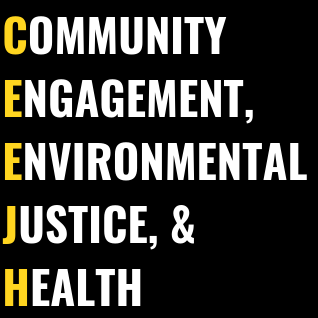THe University of Maryland Symposium on Environmental Justice and Health Disparities
Open this playlist to watch all concurrent sessions from the 7th Annual UMD EJ Symposium.
The first UMD EJ Symposium (as it is informally known) took place on Saturday, December 1, 2012 and was organized by Dr. Sacoby Wilson with support from Mustafa Santiago Ali (then Associate Director of the US EPA Office of Environmental Justice) and Leslie Fields (National Environmental Justice Director for the Sierra Club). This intersection of academic, government, and non-profit sectors for the purpose of providing environmental justice community stakeholders with a space to convene and network was the first of its kind in the DC-Maryland-Virginia region.
The 7th annual symposium was virtual with 40 engaging sessions, more than 100 dynamic speakers including representatives of domestic and international communities, and 1500 registrants. Our participants included stakeholders from impacted communities, EJ/CJ groups, green groups, academia, government, policymakers, worker groups and business/industry. The keynotes speakers in 2021 were Dr. Cecilia Martinez, the Senior Director for Environmental Justice for the White House’s Council for Environmental Quality (CEQ), and CEEJH’s Director, Dr. Sacoby Wilson.
Read the 2021 agenda below.











While specific topics and sessions vary from year to year, the conference’s overarching focus remains on environmental justice issues (and actions) relevant to the DMV region and beyond. In the last 11 years, conversations have included sustainability in the Chesapeake Bay watershed; grassroots activism; health, law, and policy tools for environmental justice communities; STEM innovations for empowering community stakeholders and more. Symposium mainstays include: food justice, energy equity, children’s environmental health, community capacity-building, built environment and social determinants of health, air pollution, and equitable development and community revitalization, among others. With feedback over time, the symposium has moved towards providing more workshops and hands-on training sessions to further empower community members and allies. Each symposium draws hundreds of attendees and speakers from diverse backgrounds.

